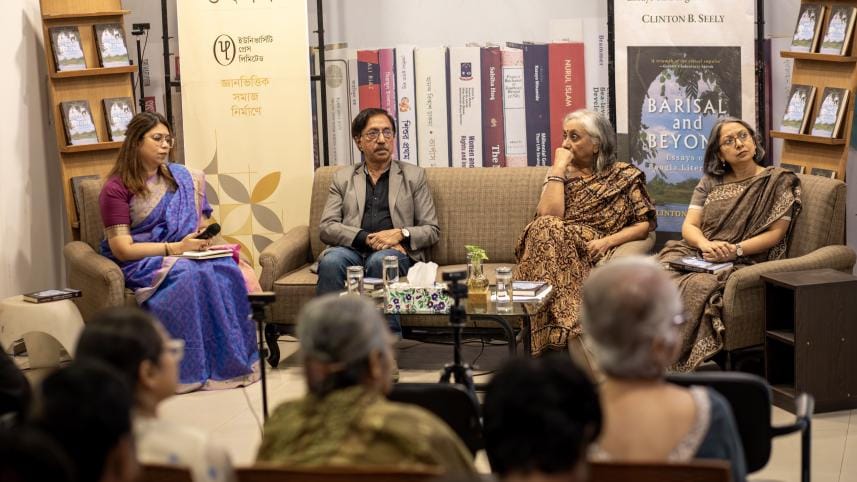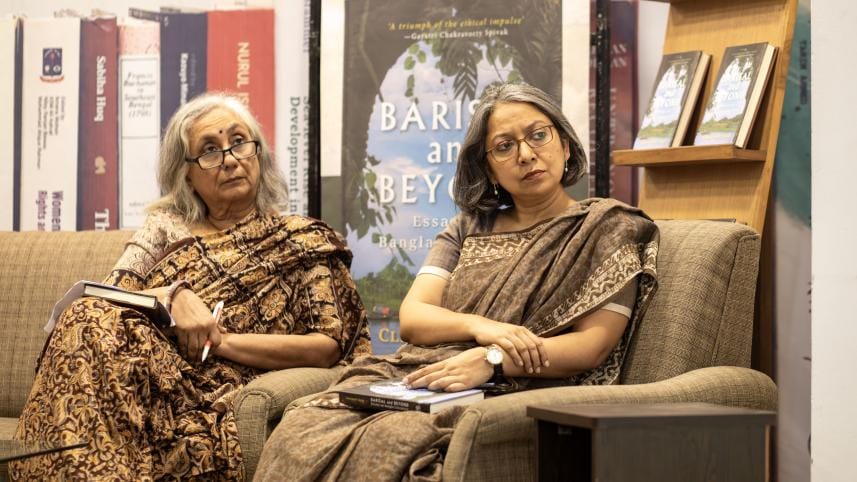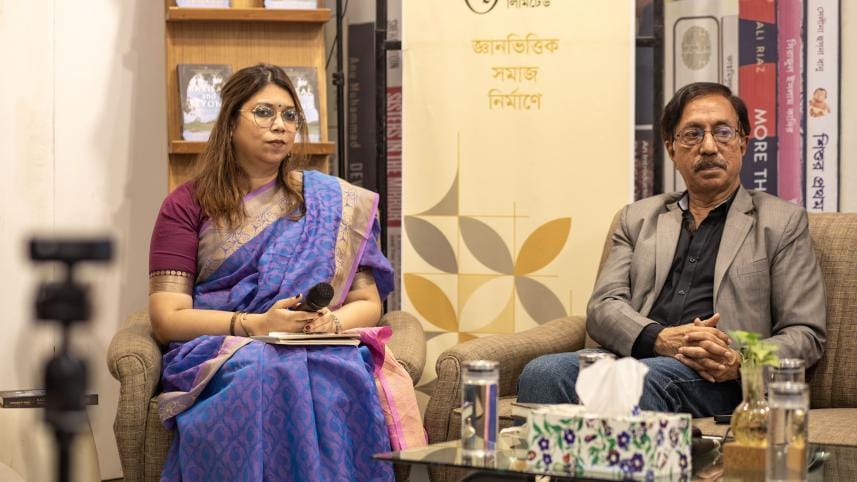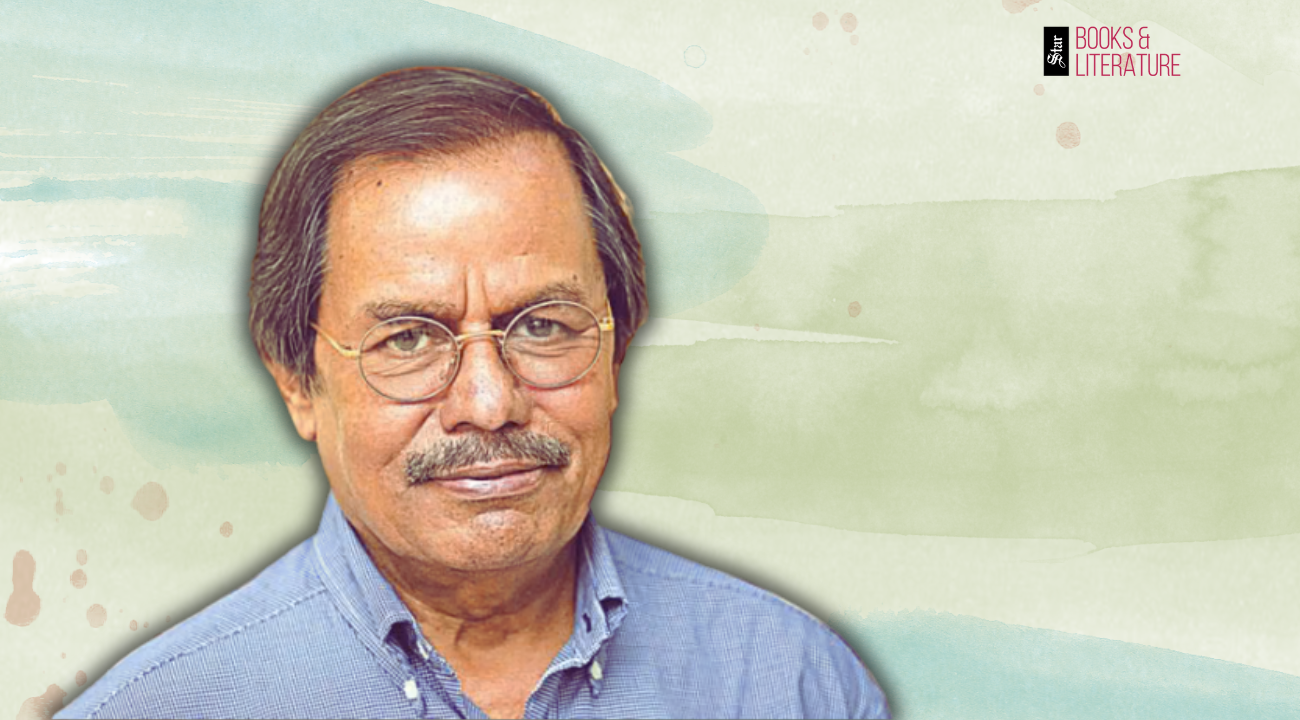‘Barisal and Beyond’ reprinted: Celebrating Clinton B. Seely’s essays on Bangla literature

On Saturday, October 11, Bengali literary writers, translators, and critics convened at University Press Limited's office in Farmgate, Dhaka, to celebrate the reprinting of Clinton B. Seely's collection of essays on Bangla literature, Barisal And Beyond (originally published in 2008). The windy weather was threatening to burst into a storm throughout the day, and the honking horns of vehicles kept escalating. Although rain never came and the bustling streets of Dhaka stayed busy as always, the guests around the world flocked in, crossing the time zones of four different regions.
While Dr Nazia Manzoor—assistant Professor and Chair, Department of English and Modern Languages, North South University and Editor, Star Books and Literature moderated the talk—the panel was graced with the in-person presence of the translator and travel writer, Faruk Mainuddin, Dr Firdous Azim, Professor and Chairperson, Department of English and Humanities, BRAC University, and Mahrukh Mohiuddin, Managing Director of UPL. The event was adopted for both in-person and virtual presence of the speaker and participants. The author Professor Clinton B. Seely was in attendance through a Zoom call from the USA. Alongside him, author, literary theorist, and feminist critic Professor Gayatri Chakravorty Spivak from Columbia University, and linguist, author, and critic, Professor Pabitra Sarkar, ex-Vice-Chancellor, Rabindra Bharati University joined online as discussants.
The event began with Syed Chowdhury—an old student and friend of the author, Clinton B. Seely—introducing the author. He also broke the news that Barisal And Beyond (2025) was finally seeing the light of day after being out of print since 2011.

The conversation on the book commenced with Dr Manzoor posing a specific question to Professor Seely regarding the tension between "ichha" and "niyom" in Rabindranath Tagore's "Tasher Desh" (1933). In his response, Dr Seely pointed towards the idea of compromise between the two opposing forces. He contemplated that compromise was the only way to navigate the murky and complicated times of the present as well. In his opening remarks, Professor Sarker articulated the problems characterising the Bengal Renaissance and the issues of "villainising the Musolman" by the early authors.
Dr Seely's story in Bangladesh begins in Barisal Zilla School in 1963, while working as a volunteer for the American Peace Corps. He taught Biology at Barisal Zilla School and slowly began to learn the Bangla language. He later translated the works of Ramprasad Sen and Michael Madhusudan Dutt. He completed his doctoral dissertation by creating a complete biography of the remarkable poet Jibanananda Das. Although conversations flowed around the interesting life and works of the author Professor Seely, other points of discourse for the night included the importance of translation and its role in literature, particularly translations of Bangla literature; the tension between public and private history, Satyajit Ray's interpretation of Rabindranath Tagore's "Noshtoneer" in the film Charulata, and Rizia Rahman's work on identity and inclusion in post-Independence Chattogram.
Eminent scholar, translator, and feminist critic, Professor Spivak, advocated for translation. She shared that she does not believe in identity politics and that we all share one identity, "that of a human". Thus, translating literature into various languages should be prioritised. Dr Azim chimed in on this, agreeing wholeheartedly with the sentiment. She praised Dr Seely's apt difference that he posits in his book between "darshan" and "dekha"—two seemingly similar but very different sentiments. She draws on how Seely mentions Edward Said and his critique of Orientalism, and how she, in turn, finds criticism in the venues of area studies. She also talks about the "soft diplomacy" of 1960s America, where Professor Seely could familiarise himself with the Bangla language due to his posting in the Peace Corps. This, Dr Azim sadly states, is a nostalgia—"a prelapsarian state".

After a short tea break, the conversation pivoted towards translator Faruk Mainuddin, who asked the audience to suggest a name for the Bangla translated copy of the book, and invited those who prefer reading in Bangla should keep on the lookout for this.
Eventually, the floor was opened to the audience for questions. Nazrul Islam, an official from the Bangladesh Secretariat, felt engaged with the conversation although he had an ostensible distance from literature. The night ended just after Mainuddin proposed to Nazrul Islam that Dr Seely be honoured as a Bangladeshi citizen in some way for his continuing contribution to Bangla literature. With that positive sentiment, the illustrious booktalk came to a close.
Tasnim Naz is an academician of English Literature at Bangladesh University of Professionals. Her research interests are feminism, motherhood study, and postcolonial studies. Reach her at tasnimnaz46@gmail.com.
Sajal Hossain Dhaly is an undergraduate student at BRAC University. He loves movies, fantasy literature, and the gym. Reach him at sajalhossain.dhaly@gmail.com.
K. M. Arefin is a passionate writer and poet. He works as a faculty member at Bangladesh University of Professionals and is a researcher of postcolonial Bengali Literature. Reach him at khanmohammadarefin@gmail.com.



 For all latest news, follow The Daily Star's Google News channel.
For all latest news, follow The Daily Star's Google News channel. 
Comments